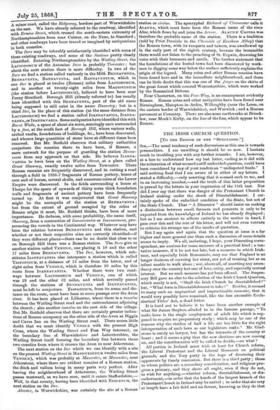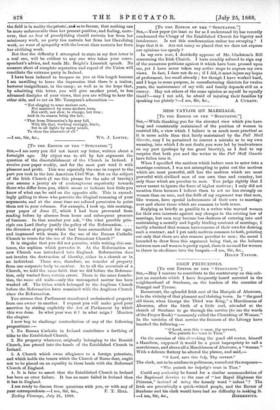THE IRISH CHURCH QUESTION. [To THE EDITOR OF THE "
SPECTATOR."] SIR, —The usual tendency of such discussions as this one is towards personalities. I am unwilling it should be so now. I hesitate much in troubling you with any further remarks. I am, however, at a loss to understand how my last letter, ending as it did with the reiteration of what seemed a still undecided question, could have been considered by any of your readers an " undisputed finale." I said nothing final that I am aware of in either of my letters. I stated a difficulty,—only asserting that it seemed such to me, and to an increasing number,—and the truth of this latter proposition is proved by the letters in your impression of the 11th inst. Nor did I ever say that there was danger of the Protestant Church in Ireland sinking under the shock of Disestablishment. I cer- tainly spoke of the enfeebled condition of the State, but not of the State Church. That " A Dissenter " should insist on making a distinction between small farmers and peasants is only to be expected from the knowledge of Ireland he has already displayed ; but as I am anxious to adhere entirely to the matter in band, I pass over this and the rest of his letter, and will not even venture to criticize his strange use of the marks of quotation.
But I say again and again that the question at issue is a far higher and more general one than such a discussion of mere details seems to imply. We all, including, I hope, your Dissenting corre- spondent, are anxious for some measure of a practical kind ; a ten- tative measure, if it be not too late, but a measure in which Irish- men, and especially Irish Romanists, may see that England is no longer desirous of coercing her sister, nor yet of treating her as an infant unable to walk alone ; nor, above all, of asserting any ascen- dancy over the country but one of love, unity, and especially mutual interest. But no such measure has yet been offered. The Suspen- sory Bill gave no clue to the solution of the Irish Church Question, which surely is not, "Shall the Irish Church be disestablished ?" but, "What form is Disestablishment to take ?" Besides, it seemed to many such an unpractical and impracticable measure, that it would very possibly have remained, like the less excusable Eccle- siastical Titles' Act, a dead letter.
It is hard not to believe it to have been another example of what Sir James Stephen alluded to in the famous passage, "To make laws is the single employment of adult life which is sup- posed to require no preparatory study ; which may be one of the reasons why the studies of half a life arc too little for the right interpretation of such laws as our legislators make." Mr. Glad- stone is surely no lawyer, but has the interests of the country at heart ; and it seems a pity that the new elections are now coming on, and the constituencies will be called to decide,—on what ?
All parties in Ireland must wish at least for Church reform, the Liberal Protestant and the Liberal Romanist on political grounds, and the Tory party in the hope of disarming their
opponents by timely concession. lint there is a third party ; those to whom politics are a secondary consideration, and religious pro- gress a primary, and they above all ought, even if they do not,
to wish for anything,—whether reform, disestablishment, or dis- endowment,—in order that the hands of the largest branch of the Protestant Church in Ireland may be untied ; in order that she may at length have a fair field and no favour, knowing as they do that the field is in reality theprieste, and as to favour, that nothing can be more unfavourable than her present position, and feeling, more- over, that no fear of proselytizing should restrain her from her missionary work, no party ties restrain her from her liberalizing work, no want of sympathy with the lowest class restrain her from her civilizing work.
But that the difficulty I attempted to state in my first letter is a real one, will be evident to any one who takes your corre- spondent's advice, and reads Mr. Bright's Limerick speech. No measure short of complete separation and repeal of the Union will conciliate the extreme party in Ireland.
I have been induced to trespass on you at this length because I am unwilling to leave the impression that there is a traitor, however insignificant, in the camp ; as well as in the hope that, by admitting this letter, you will give another proof, to less advanced disciples of your views, that you are willing to hear the other side, and to act on Mr. Tennyson's admonition :—
" Not clinging to some ancient saw,
Not mastered by some modern term, Not swift, nor slow, to change, but firm ; And in its season bring the law, "That from Discussion's lip may fall, With life that, working strongly, binds, Set in all lights by many minds, To close the interests of all."































 Previous page
Previous page